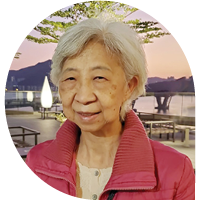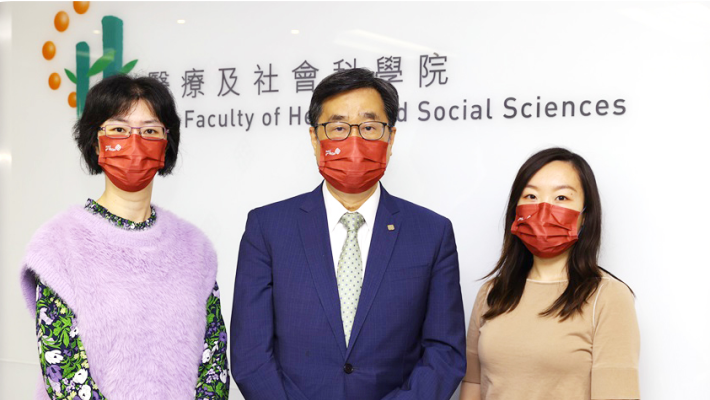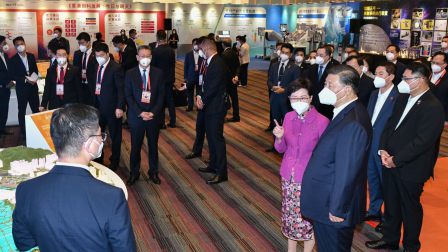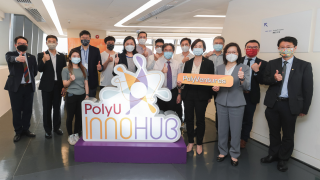Joint research on the impact of COVID on Hong Kong people’s mental health
Mental health is another significant area being tackled by PolyU through its interdisciplinary research efforts. Recently, the University’s Mental Health Research Centre (MHRC) announced the findings of a research project involving scholars from different disciplines who had joined forces to explore the level of adult psychological trauma one year after the onset of the COVID-19 pandemic.
The research team comprises MHRC’s members Professor David Shum, Dean of Faculty of Health and Social Sciences and Yeung Tsang Wing Yee and Tsang Wing Hing Professor in Neuropsychology; and Dr Sally Cao, Research Assistant Professor of the Department of Rehabilitation Sciences; as well as Dr Judy Siu, Associate Professor of the Department of Applied Social Sciences.
With the support from the Health and Medical Research Fund of the former Food and Health Bureau, the team conducted the research from late 2020 to early 2021 when Hong Kong was under the fourth wave of the pandemic. The study results were published in the academic journals BMC Psychiatry and BMC Geriatrics in April 2022. The study comprised two parts:
More than one in ten showing PTSD symptoms
Part 1 of the Study
Format: telephone survey
Sample size: over 3,000
Target : Hong Kong residents, mostly working adults
Period : December 2020 - February 2021
The survey found that:
• 12.4% of the respondents had exhibited post-traumatic stress disorder (PTSD) symptoms.
• A higher chance of having PTSD symptoms was seen among the unemployed or people with no personal income and lower educational attainment.
• Married females in their middle age or older with higher educational attainment were consistently more likely to comply with the various anti-epidemic measures.
• Among all the measures, maintaining good hand-hygiene and environmental hygiene were reported to be the most difficult to follow.
• About 46% of the respondents were willing to receive the COVID-19 vaccine; the majority of them were married males in their middle age or older who were family caregivers with lower educational attainment.
• Respondents who watched pandemic-related news for more than one hour a day were more compliant with anti-pandemic measures and related advice, and showed more severe PTSD symptoms.
Elderly people’s perception towards vaccination
Part 2 of the Study
Format: in-depth interview
Sample size: 31
Target : adults over the age of 65, ~70% were retired
Period : November 2020 - February 2021
The purpose of this interview was to discover the mental status of the older adult population in the face of the pandemic, e.g. their understanding, feelings, behaviour, and perception of vaccines.
The interviews found that:
• The elderly respondents generally believed COVID-19 was highly transmissible. Consequently, most of them avoided leaving home for exercise and halted many regular activities.
• While most of the interviewees reported having felt worried, helpless or depressed, some of them even expressed frustration during the interview.
• The interviewees’ willingness to be vaccinated was primarily affected by their personal experiences and opinions of their peers and families.
• Lack of understanding about the vaccines, cultural perception and peer pressure were the main contributors to hesitancy, while fragile social networks and weak family support posed the greatest barriers to vaccination.

Ms Cheung Wah-chun, a 75-year-old lady who lives alone, was among the elderly interviewees who experienced anxiety and depression under the COVID-19 pandemic. Luckily, she managed to overcome her anxiety with the support provided by an NGO.
Mental health advice on living with the pandemic
Professor David Shum who led the research team advised, “The public should carefully assess PTSD symptoms caused by the pandemic and pay close attention to changes in their own bodies, feelings, behaviours and socialising activities. They should seek help from professionals or social welfare organisations once symptoms begin to affect their daily lives for a period of time.”
Dr Judy Siu advised that clearer health information about the vaccines should be disseminated to the elderly, and support for the elderly before and after vaccination should be strengthened to ease their concerns about receiving jabs. “We suggest strengthening the ties between non-governmental organisations (NGOs) and the elderly to help ensure the latter’s physical and mental health,” Dr Siu said.
According to Professor Shum, the team will take the interdisciplinary research forward to provide to NGOs professional advice tailored to the elderly’s physical and mental health needs during the pandemic.






